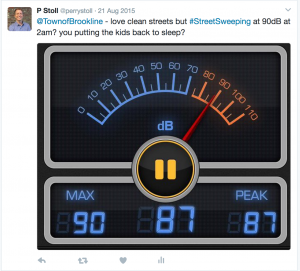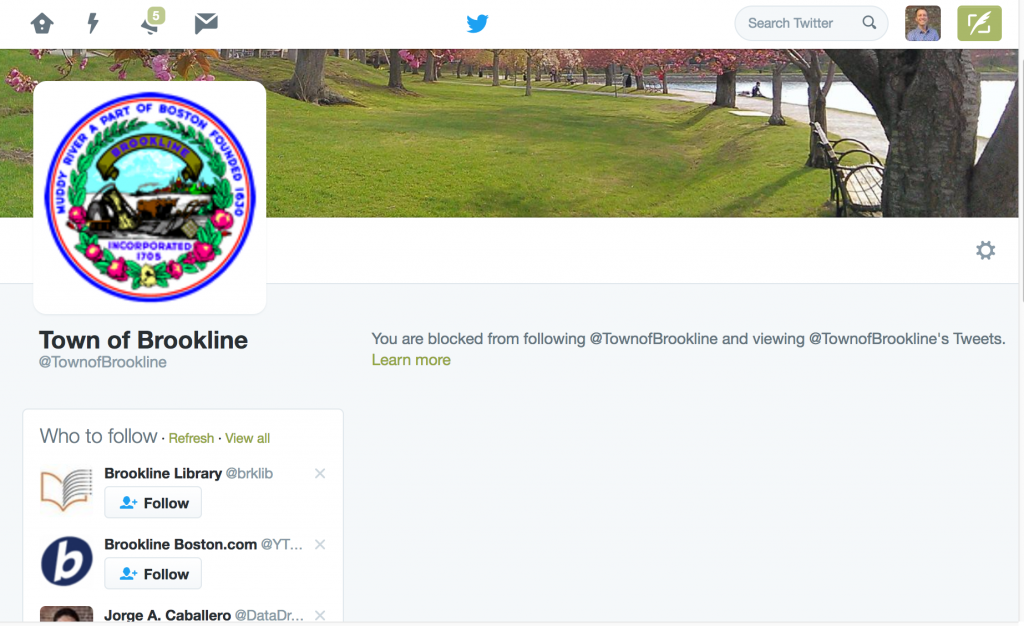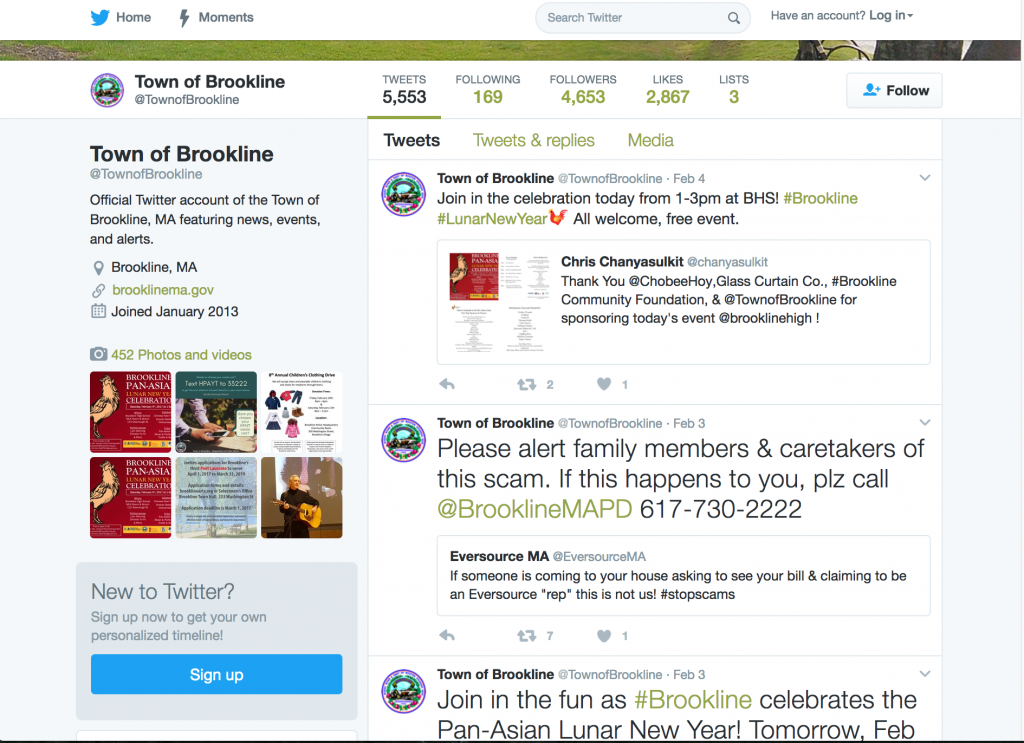tl;dr Can your local, state, or federal government block you on Social Media? My town blocked my Twitter account and I have no idea why. And I suspect neither do they. What does this mean in the “digital age” and e-government? Time to ask some questions and hold them accountable.
I’m Blocked on Twitter
I was going to ask the Brookline Dept of Public Works (DPW) a question about the new Pay-As-You-Through (PAYT) trash system. So I went online, looking for their twitter handle. Other neighboring Depts. of Public Works are online in CambridgeDPW and Boston DPW, Newton DPW. So the Town of Brookline is on Twitter, FaceBook, and even Instagram, but the Brookline Dept. of Public Works isn’t. Too bad.
Brookline DPW not on twitter? Ok, I’ll fall back to the general “Town of Brookline”. But strange, I couldn’t seem to find that one either. Until I went directly to the page after looking up their handle on a search engine (and using a private/incognito mode in the Browser).
Well, hello – I’ve been blocked on Twitter by the government of the town in which I am a resident.
Huh – that’s interesting. Why in the world? And … can they do that??
I hadn’t noticed because…Twitter is blocking their tweets from me. In the busy flow of life, I just had not noticed. Here is what most citizens see, e.g. when using a private/incognito mode of a web browser. Note the alert, celebration announcements, civic actives:
Why’d They Do That?
Why is a resident, citizen, voter, tax-payer actively banned by the Town of Brookline from seeing citizen alerts, celebrations, community notifications?
I did run a political campaign opposing the School Committee and Selectmen on a financing issue for a school capital project. Was this in response to me expressing my political opinions? Probably not.
I have been active on a Town of Brookline Facebook page regarding School issues. Was it that? Probably not.
I tweeted to the @TownOfBrookline on Twitter back in 2015. Is my local governmental being thin skinned about cheeky but factual citizenry feedback? Uhmm…?

A tweet to TownOfBrookline back in 2015. Yes, I measured it with a decible meter. Do you know how loud 90Db is?
But why do I have to speculate on the matter at all?
Yes, admittedly asking for government accountability on something as small as “Why’d You Block My Twitter Account?” may seem .. odd. small. insignificant. But IMO it really is something larger. Maybe it is the current political climate. But I think the point here is worth some small effort in thinking through how governments communicate and interact with citizens.
Information Wants to be Free-ish
Does your government have the right to withhold or block information from you? If so, under what conditions?
Clearly the answer is yes. Because you and I don’t know all the national secrets, e.g. nuclear weapon specifications, interrogation policies, etc. So in the name of national security, we sometimes say “yes”, certain information should be withheld.
But in general, we believe that the information the government collects serves the citizenry and so should be generally available to them with the specific purpose of holding government accountable for its actions. Hence, we the people have established rules like the Freedom of Information Access FOIA for the US Federal Government. At the state level in Massachussettes, we have Public Records Requests. And having issued public record requests in the past to my town, I can agree with some assessments of how Towns and Cities perform. But details on that are for another day.
Some cities are leading on the open data issue – Boston and Cambridge, MA come to mind. Many are trying. So what does it mean to say that the Town is going to limit access to information from some users?
How About a Policy
I suspect this will turn out to be somewhere between a case of governmental sloppiness, thoughtlessness, or an individual acting without thinking it through. But that is no excuse to allow a lack of thoughtful policy. What types of accountability do they have when they take such action?
I think the salient questions that the Town of Brookline needs to answer, both to me but also more generally:
- Does the Town have the right to block a user on Social Media (e.g. Twitter, FaceBook Instagram, etc)?
- Does the Town consider block a user on Twitter a restriction of access to information?
- Does the Town restrict selected citizens in other public forums, e.g. from their CivicAlert email system?
- If blocking a user is ok, under what conditions? Harassing activity? Expressing political speech?
- Does the Town have a vetted policy? Is it taking steps to follow that policy?
- Does the Town need to disclose the blocking of an account? To whom – the blocker? The general public? How does it report this information,e.g. annual reports, a FOIA/PRR process?
- Is there an public process to appeal such a blocking, either mistaken or intentional?
These are the most basic questions around government accountability.
My Request for Public Records
I go ask my Town how we got here. This will include a making Public Records Request to the Town of Brookline. I’ll probably also go to the Board of Selectmen (our local, volunteer citizen executive branch, equivalent to a Mayor) and ask for their policy around social media and limiting information.
The questions I’ll be seeking answers to include:
- Does the Town of Brookline have a policy around blocking accounts on Social Media and Twitter in particular?
- Has this policy been publicly discussed?
- If so, where does this policy document reside?
- Does the policy proscribe under what conditions a user may be blocked on social media by the Town of Brookline?
- Does the Town of Brookline make a distinction between blocking a resident of Brookline and non-residents?
- Does the Town of Brookline consider the information disseminated on Twitter to be of general community interest to residents of Brookline?
- Is there notification of blocking on Twitter so that an appeal can be made?
- Is there an appeals process to allow for the restatement of access if a determination was made that the blocking was not in compliance with Town of Brookline policy?
- What official in the Town manages the official Town of Brookline twitter account?
- Does this official report the status of blocked users to any elected Town officials in the Town?
- Has this official been trained in the Town policy on blocking residents on social media?
- What criteria does the Town of Brookline decide what accounts to block on Twitter?
- When was my Twitter account blocked by the Town of Brookline?
- What was the specific justification for deciding to block my account?
- How often is this happening?
- How many accounts on Twitter has the Town Blocked on Twitter?
- How many accounts are being blocked on other Social Media sites?
Governmental Accountability
Why do I care about something as seemingly innocuous as blocking my twitter account?
I’m a long time believer that governments, in particular at the local and state level, need to be more thoughtful as they step into the digital age. In particular, there is not enough good governance over digital data.
A recent example in my local town was around traffic cameras. There was strong civic discourse and debate on the topic, something that happened in neighboring towns as well. The police expressed what they wanted too. In the end, the citizens demanded a limited access policy, over a series of compromises, established a system of oversight. Over time and through the power of government ennui, the Police took the rights they wanted, depriving the citizens of what they had established through self-government.
The main issue being – if access to data by government officials could reasonably be used to track, intimidate, or harass political opponents or other expressions of free speech, we need to define proactively the appropriate safeguards and limits to be imposed. And even then, unfortunately the track record on honoring their commitments isn’t great.
Traffic camera data with unfettered access by an angry department head could reasonably be used to track political enemies, a crossed paramour, or student protestors. So policies need to be put in place. In the case of data, they need to address the topics of:
- Authorization: define who is authorized to access the data and under what conditions;
- Access Control: Define under what circumstances various actors can access the data- e.g. via court order, urgent criminal investigation, town quality of life research/traffic analysis,
- Access Records: Establish a mechanism to keep track of when and by whom the data was accessed;
- Retention: Define how long the data will be kept;
- Fidelity/Resolution/Detail: does certain elements in a data set be scrubbed, redacted, anonymized or otherwise limited when accessed? Shouldn’t we redact e.g. license plate information for a traffic flow study? There is a general notion in information security around a policy of least privilege, i.e. limit what folks can see to what they need to see. A similar guiding principle ought to be at play with governmental access to digital information.
So let me see where this path leads from my town. I’ll get back you on how things go.


